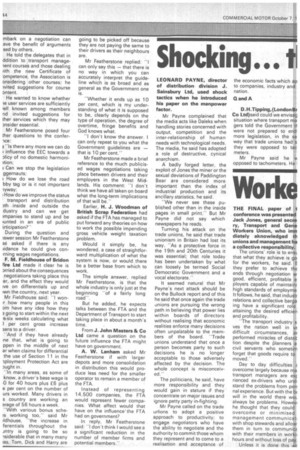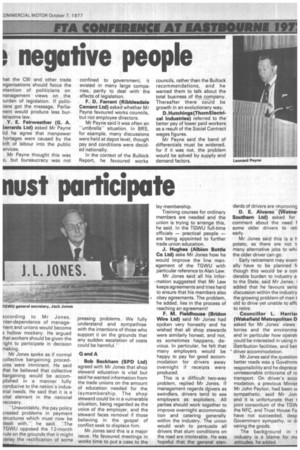Worke nust participate
Page 46

Page 47

If you've noticed an error in this article please click here to report it so we can fix it.
THE FINAL paper of t conference was presented Jack Jones, general secre ry, Transport and Gene Workers Union, who imn diately aknowledged iii unions and management ha a collective responsibility.
The unions' role is to ens' that what they achieve is go for the workers, he said. E they prefer to achieve thE ends through negotiation w good, efficient, profitable e ployers capable of maintaini high standards of employme It follows, he said, that industr relations and collective barga ing have a significant role. attaining the desired efficien and profitability.
"The transport industry s ves the nation well in ye difficult circumstances, at performed miracles of distrit tion despite the Planners a civil servants who sometim forget that goods require to moved."
Day to day difficulties E overcome largely because ma transport managers are exf rienced ex-drivers who und,
stand the problems from per nal experience:. But with the IN will in the world there wot always be problems. Howevi he thought that they could overcome or minimised
management communicat, with shop stewards and allow them in turn to communicE with their members in workii hours and without loss of pay. Unless it is done this tA/F 3ccording to Mr Jones, nter-dependence of manage-nent and unions would become 3 hollow mockery. He argued that workers should be given the right to participate in decision making.
Mr Jones spoke as if normal collective bargaining procedures were imminent. He said that he believed that collective bargaining would be accomplished in a manner fully conducive to the nation's industrial needs. He said that it is a vital element in the national recovery.
"Unavoidably, the pay policy created problems in payment structures which must now be dealt with," he said. "The TGWU opposed the 12-month rule on the grounds that it might delay the rectification of some In& pressing problems_ We fully understand and sympathise with the intentions of those who support it on the grounds that any sudden escalation of costs could be harmful."
0 and A
Bob Beckham (SPD Ltd) agreed with Mr Jones that shop steward education is vital but said he wanted information from the trade unions on the amount of education needed for the laymembership. The shop steward could be in a vulnerable situation, being regarded as the voice of the employer, and the steward -faces removal if those believing in the gospel of conflict seek to displace him.
Mr Jones said this is a major issue. He favoured meetings in works time to put a case to the lay membership.
Training courses for ordinary members are needed and the union is trying to arrange this, he said. In the TGWU full-time officials — practical people — are being appointed to further trade union education.
J. Hughes (Albion Bottle Co Ltd) aske Mr Jones how he would improve the line management of the TGWU with particular reference to Alan Law. Mr Jones said all his infor, mation suggested that Mr Law keeps agreements and tries hard to ensure that his members also obey agreements. The problem, he added, lies in the process of reaching an agreement!
F. M. Fieldhouse (Bridon Wire Ltd) said Mr Jones had spoken very honestly and he wished that all shop stewards were similarly honest, and not, as sometimes happens, devious. In particular, he felt that many employers would be happy to pay for good accommodation for drivers away overnight if receipts were produced.
This is a difficult two-way problem, replied Mr Jones. If management regards dOvers as swindlers, drivers tend to see employers as exploiters. All parties should work together to improve overnight accommodation and catering generally within the industry. The union would wish to persuade all drivers that slum conditions on the road are intolerable. He was hopeful that the general stan dards of drivers are improving
D. E. Alvarez -(Watnel Southern Ltd) asked for comment about the need f some older drivers to reti early.
Mr Jones said this is a h potato, as there are not ti many alternative jobs to whi the older driver can go.
Early retirement may event ally have to be planned ft though this would be a con derable burden to industry a to the State, said Mr Jones. I added that he favours serio discussion within the industry the growing problem of men t old to drive yet unable to affc to retire.
Councillor L. Harrisi (Wakefield Metropolitan D asked for Mr Jones' views lorries and the environme and in particular how operati could be interested in using rl distribution facilities, and bet driver accommodation.
Mr Jones said the question better roads was a Govarnmt responsibility and he depreca' unreasonable criticisms of ro transport. On driver's acco modation, a previous Minist Mr John Peyton, had been NA sympathetic, said Mr Jam and it is unfortunate that 1 joint consortium of the TGN.At the NFC, and Trust House Fo have not succeeded, desp Government sympathy, in di vering the goods.
The background in t industry is a blame for mE attitudes, he added.












































































































